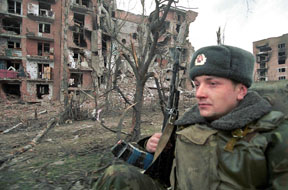|
Russia refuses to learn from its mistakes in Chechnya
By
Fred Weir
Moscow
|
|
|
A Russian
soldier in the pile of rubble that |
One thumbnail definition of insanity is when someone does the same thing over and over, but expects different results. By this measure, Russia's political and military elite are sliding inexorably into the blood and muck of a second war in the Caucasus because they have taken leave of their senses. Whatever the Kremlin may say, the 4-month-old "anti-terrorist" operation against the tiny separatist republic of Chechnya is turning into a full-scale replay of the disastrous two-year conflict that ended in humiliating defeat and the withdrawal of Russian troops in 1996.
"The new war in Chechnya is part of a political strategy for consolidating power in Moscow," says Alexander Iskanderyan, director of the Center for Caucasian Studies in Moscow. Acting President Vladimir Putin, who faces elections on March 26, has staked his reputation on bringing rebel Chechnya to heel, halting the disintegration of Russia and restoring "order." Strong public approval of the war brought the Kremlin victory in December parliamentary elections. But the war news has turned grim, and Putin's popularity is declining.
"We are headed down a well-trodden path to disaster, like the last Chechen war, or the Soviet Union's failed intervention in Afghanistan," Iskanderyan says. "What is meant to be a swift military operation to solve a political problem turns into a long guerrilla struggle. We respond with massive repression against the civilian population, and in the process we lose any hope of solving the political problem."
Fred Weir is a contributing editor of In These Times.
![]()
|
In These Times ©
2000
Volume 24, Number 7 |

